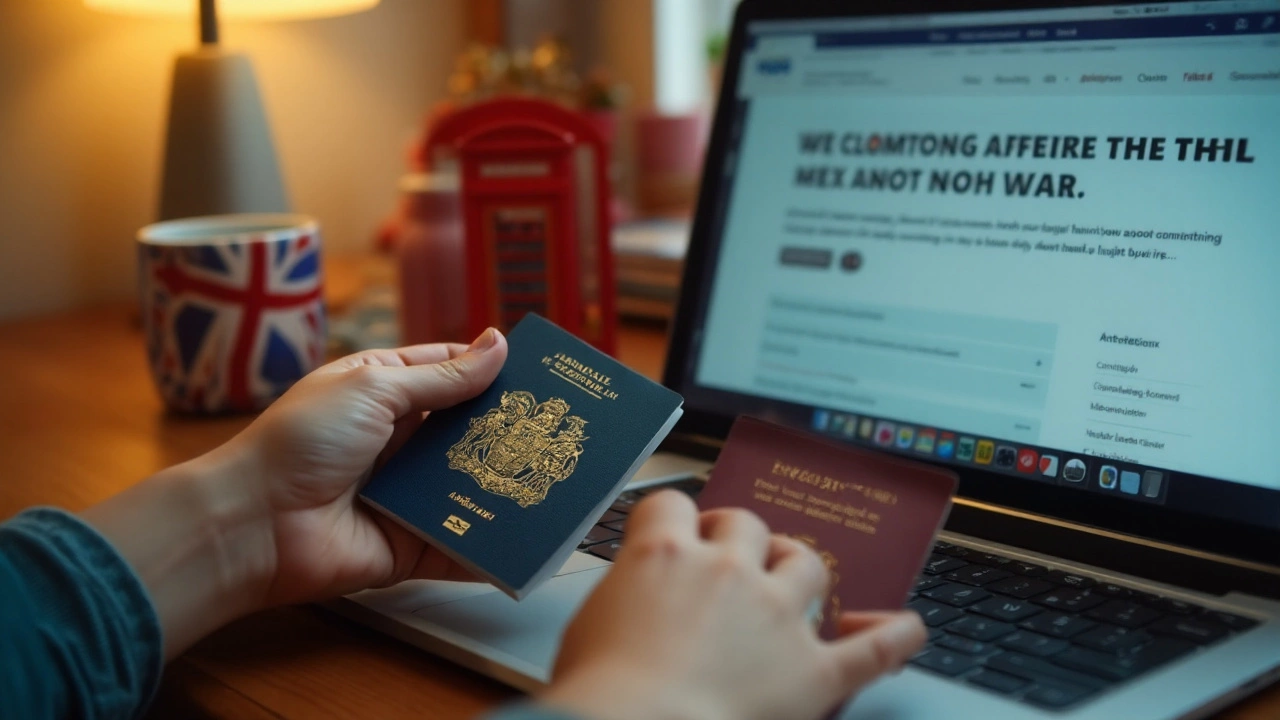Imagine watching your savings grow tax-free while sipping coffee in Sydney and thinking about how to squeeze the most out of every dollar (or pound). UK’s Individual Savings Accounts, or ISAs, are like treasure chests for locals—offering zero tax on interest, dividends, or gains. Who wouldn’t want a piece of that action? But if you don’t carry a British passport, is ISA magic out of reach for you? Spoiler: it’s not always about your passport, and there’s plenty wrapped up in the rules to unpick. If you’re dreaming of returning to Blighty someday, or just want to give your kid Dante a leg-up with some sturdy savings, this is must-know territory.
What Exactly is an ISA and Why Do People Want One?
Let’s get to the core: an Individual Savings Account (ISA) is a UK government-backed savings or investment product. A huge draw? All the returns inside an ISA stay blissfully untouched by UK tax. There are four main types—Cash ISA, Stocks and Shares ISA, Innovative Finance ISA, and Lifetime ISA. Each has its own quirks, annual limits, and age brackets.
For 2025, you can stash up to £20,000 a year across any mix of accounts. Growth inside remains tax-free, which is a rare find—even here in Australia, there’s really nothing quite the same. Some ISAs are for pure savings, others let you bet on the stock market, and Lifetime ISAs offer a reward if you’re planning for your first home or retirement. If you open a Junior ISA for your kid (trust me, as a dad, these get your financial parent-nerd heart racing), you can pop up to £9,000 a year per child.
The catch? You need to meet certain eligibility rules—not just for each type of ISA, but also for getting your foot in the door. Many expats and globetrotters get caught out not by their nationality, but by where they plant their feet each year.
People love ISAs because there’s no reporting of interest to HMRC, no CGT on profits, and no fiddly paperwork when you sell. There’s a reason that, as of 2024, UK savers tucked away over £700 billion in these accounts—even those that can just about squeeze in are keen to do so. It’s clear: ISAs are the UK’s favorite way to save for anything from rainy days to new homes, weddings, or even, as Dante would insist, a collection of vintage LEGO sets.

Who Can Actually Open an ISA? Debunking Nationality and Residency Myths
Let’s clear the fog—ISA eligibility rules are less about your passport and more about your tax home. To open and pay into an ISA, you must be a UK resident for tax purposes. That means you normally need to live in the UK for most of the year and be subject to UK tax laws. Your citizenship? That’s often irrelevant. You can be an Aussie, Canadian, or a Martian, but if you’re paying tax in Liverpool or London, you’re in the game.
The only big exception? Crown employees (like soldiers or diplomats) living abroad for work, and their spouses. They get ISA privileges, even while sipping pints in Europe or posting selfies from Singapore. For everyone else, you need up-to-date UK tax residency. The rule applies no matter how long you’ve lived in the UK previously—if you move overseas, fresh ISA deposits halt almost immediately.
For many people who move away—think Aussies heading home after a London working holiday, or Brits going walkabout beneath Southern Cross skies—the bad news is you can’t keep topping up ISAs from outside the UK. Your existing ISAs remain open and sheltered, but they’re in stasis: you can’t add new money in most cases. Junior ISAs? Same rules apply, and this often throws parents for a loop. Opening a new one or making extra contributions for your child from outside the UK is off-limits unless you’re a Crown employee overseas.
What about dual citizens? It doesn’t help. The golden ticket is tax residency, not citizenship. A permanent resident visa in the UK, or even indefinite leave to remain, also doesn’t do the trick unless you are truly living and paying tax there. This catches out plenty of globetrotting digital nomads who chase the best tax deals—the UK won’t let you have your tax cake and ISA it too if you’re no longer resident.
But there’s wiggle room for brief absences. If you’re off backpacking for a few months, or taking a temporary contract overseas for less than a full tax year, you can generally keep making ISA contributions as long as you’re still classed as a UK resident by HMRC’s rules. That said, as soon as your residency changes officially, your right to pay in vanishes. Banks and investment platforms in the UK are highly attuned to this—they check your address details and will freeze new contributions the minute you change your declared home to, say, Bondi or Brooklyn.
| Eligibility Factor | Details |
|---|---|
| Age | 16+ for Cash ISAs, 18+ for Stocks & Shares/Innovative Finance ISAs, 18-40 for Lifetime ISA |
| Residency | Must be resident in the UK for tax purposes |
| Citizenship | Any nationality can qualify—residency is key |
| Absence Allowances | Short trips under 12 months are usually ok |
| Junior ISAs | Parent/guardian and child must live in the UK unless Crown employees abroad |
| Crown Employees | Special exemption allows ISA deposits while working for UK government overseas |
The takeaway? If you’re not resident in the UK, you can’t open or continue funding an ISA—no matter your citizenship. Aussie passport? Doesn’t hurt you, as long as you’re clocking up days in the UK and paying tax. Permanent Aussie with dreams of British ISAs from afar? Microphone drop. It’s a no.

Smart Moves and Alternatives for Non-Residents and Expat Savers
If you’re plotting an ISA strategy from outside the UK, you’re probably facing a hard no. But maybe you’re about to move back, or you’re planning a London sabbatical or want to set something up for the kids when you touch down. So, what can you do—and what shouldn’t you bother trying?
First: don’t try to trick the system. Banks and platforms have tight anti-laundering checks, and if your UK address is fake, or you fib about tax home, expect frozen accounts or headaches down the track. Truth is, HMRC doesn’t mess around. The penalties aren’t worth it.
But if you’re about to become UK resident (moving this tax year), you can absolutely open and start contributing to an ISA as soon as you’ve landed. Get proof of address fast—a rental agreement, UK utility bill, or bank statement in your name helps. Some providers want a few months’ address history, but many will work with newly arrived residents, especially if you’ve got a job contract or evidence of tax residence. Hit the ground running and open an ISA early in the tax year to maximize your contribution window—every April 6th, the annual limit resets, so even if you move mid-year you might be able to squeeze out two allowances.
If you’re planning kids’ finances, check if a parent or legal guardian is already UK resident. That person can open a Junior ISA on the child’s behalf. Just be ready with the right docs—proof of residency is king. Junior ISAs are often overlooked, but they still pack a punch for family wealth building (and with Dante, any clever way to build up fun money for the future is a win).
What about ISAs you already have? If you move abroad, you don’t have to close your accounts—your savings keep growing tax-free in the UK. You just can’t add more money while away. Some platforms might ask you to convert investments or provide an overseas address update, especially if post-Brexit laws affect how they deal with non-UK EU residents, but your money remains inside the ISA wrapper, protected from UK tax for as long as you hold it.
- If you’re never going to be UK resident, look for similar tax-advantaged accounts in your home country (Australia’s offset accounts and superannuation funds are the local options here, with tax perks built in).
- Need access to UK investment opportunities? You can usually hold investment accounts via international brokers, but these aren’t ISAs and don’t offer tax-free perks. Tax consequences will depend on your home country’s laws—be sure to check with a cross-border specialist before investing.
- If you return to the UK, reactivate your ISA contributions right away—no need to open a new one if you have an old ‘dormant’ account.
- Check exchange rates and timing if you’re planning to contribute from overseas funds. Sterling swings can boost (or shrink) what you get for your money.
- Keep an eye on policy changes. The UK can tinker with ISA perks and rules post-election or at new budgets, so it pays to read up before making any big savings moves each year.
Some clever expats use their UK years to max out their ISA limits, then leave those pots sitting tax-free for decades while living overseas. When they come back—say for retirement—they can draw from those accounts with no UK tax hit. Anyone plotting a future move like this should top up ISAs before leaving, as after you’re gone you’ll miss out on years of tax-free growth potential. Just don’t expect magic workarounds; the rules are crystal clear, and banks have plugged the loopholes.
If you’re in Sydney and dreaming of ISAs, don’t waste time trying to game the residency system. Focus on local options, or make the most of any future UK stint by opening and stuffing an ISA the minute you hit British soil. Otherwise, enjoy your savings where you are—just resist the urge to envy what the neighbours across the world can do with ISAs. They might be jealous of your sunshine.

